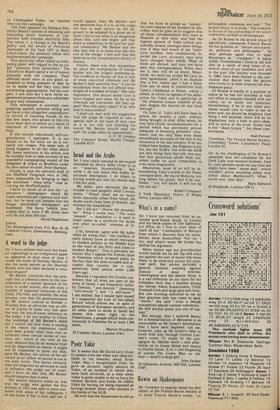A word to the judge
Sir: 1 have seldom read such hot-headed vapourings in an overground paper hs appeared in your issue of June 2 under the name of Dorothy Becker. Is she the same person as the Dorothy Becker who has been declared a vexatious litigant? Ms Becker conceives that the principle that a tribunal comes to the consideration of a matter ignorant of the facts is under attack; and she cites a number of supposed instances of this trend. The first, and possibly the most fatuous, was that the pronouncement by Mr Justice Lawton in Rondel v. Worsley that an advocate was an officer of justice in some way laid open the way for out-of-court influence on the judge. I do not profess to follow the workings of Ms Becker's mind; but I cannot see how from a reading of the report the impression could have been gained other than that an ' advocate owes certain duties of candour, etc., which in the view of the court demand that he be immune from suit by disgruntled ex-clients. It might not be inapposite to point out that, pace Ms Becker, the notion of the advocate as an officer of justice is not in the least novel. This status certainly does not empower an advocate to seek to influence the judge out of court, and I have no idea why Ms Becker should imagine that it does. The second instance relied on was that the judge who gaoled the five dockers in 1972 was said to have conferred with some of his colleagues. I do not know if this is true, and nor, it would appear, does Ms Becker; and one presumes that if it is, all the judge did was to seek advice on the approach to be adopted to a given set of facts. I fail to see what is so dangerous about this; and one might add that there is something to be said for judicial consistency. Ms Becker has the idea that this is in some way the thin end of the wedge. I feel sure that she believes in the conspiratorial theory of
history.
Finally, there was that mysterious bit about the interpolation of foreign matter into the judge's summing-up. The evidence in favour of this is that of three convicted criminals and Ms Becker's bald assertion that "it can be established from the full official transcripts of a number of trials." Not very impressive. One should clearly love to have chapter and verse. As far as the Criminals are concerned, did they appeal? Was this point taken? If so, why was it unsuccessful? I shall not deal with the suggestion that the judge be required to take a special oath at the start of each case as it is too silly and insulting for words. Ms Becker should read the oath the judge takes on appointment.
The Common Room, Middle Temple, London EC 4


































 Previous page
Previous page